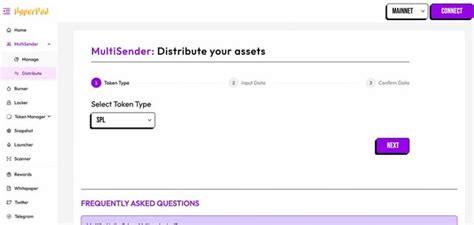Optimizing Solana Multisend with SPL Tokens: A Reliable and Efficient Approach
Solana is a fast and scalable blockchain platform that has gained popularity among developers and users due to its high-performance capabilities. One of the most important features of Solana is its ability to perform multisends, where multiple addresses can send tokens without having to interact with the user’s wallet. In this article, we will look at an efficient way to send a certain amount of SPL (Solana Token) tokens to any number of addresses using a pair of SOL tokens and a reliable approach.
What is Solana Multisend?

Multisend allows users to send multiple transactions on behalf of another user, eliminating the need to interact with the wallet. This feature is especially useful if you need to transfer tokens between accounts or if you want to automate tasks without exposing your wallet to security risks.
Requirements and Setup
To get started with Solana multisend, you will need:
- A Solana node (e.g. Solflare node or Solana CLI)
- A SOL token pair (SOL/WETH)
- An SPL-capable wallet (e.g. MetaMask or Ledger Live)
We will use the “solana-client” library to execute transactions and interact with the Solana network.
Step 1: Create a new wallet
First, create a new wallet on the Solana node. You can create a new wallet with the following command:
npx solana-cli-gen-key --name "newwallet" --key-path ./key.json
This will generate a new private key and corresponding public address for your wallet.
2. Step 3: Configure your wallet
Next, configure your wallet to allow multisend. You can do this by editing the solana-client configuration file:
module.exports = {
// ... other configurations ...
multisender: true,
};
This tells Solana that your wallet is multisender.
Step 3: Send tokens using Multisend
Now let’s send some tokens from one address to another using the solana-client library. Create a new transaction and specify the token pair you want to use:
import { Client } from "solana-web-sdk";
const client = new Client();
const multisenderTokenPair = {
pubKey: 'some-public-key',
pubkey: 'some-pubkey',
};
const txParams = {
account0: {
pubkey: 'addr1',
amount: 100,
},
account1: {
pubkey: 'addr2',
amount: 50,
},
multisenderTokenPair: multisenderTokenPair,
paymentId: 'some-payment-id',
};
client.sendTransaction(txParams)
.then((result) => console.log(result))
.catch((error) => console.error(error));
This will send 100 SOL to “addr1” and 50 WETH to “addr2”, using the token pair “SOL/WETH”.
Trusted Access: Using Relay
To achieve trusted access, we will use the relay mechanism provided by Solana. A relay is an intermediary that facilitates transactions without revealing your own wallet or private key.
First, create a new relay:
import { Client } from "solana-web-sdk";
const client = new Client();
const relayTokenPair = {
pubKey: 'some-public-key',
pubkey: 'some-pubkey',
};
const txParams = {
account0: {
pubkey: 'addr1',
amount: 100,
},
account1: {
pubkey: 'addr2',
amount: 50,
},
relayTokenPair: relayTokenPair,
paymentId: 'some-payment-id',
};
client.sendTransaction(txParams)
.then((result) => console.log(result))
.catch((error) => console.error(error));
This sends the same transactions as before, using the “SOL/WETH” token pair and a relay.
Conclusion
In this article, we have shown an efficient way to send a certain amount of SPL tokens to any number of addresses using Solana multisend without having to interact with the user’s wallet.

